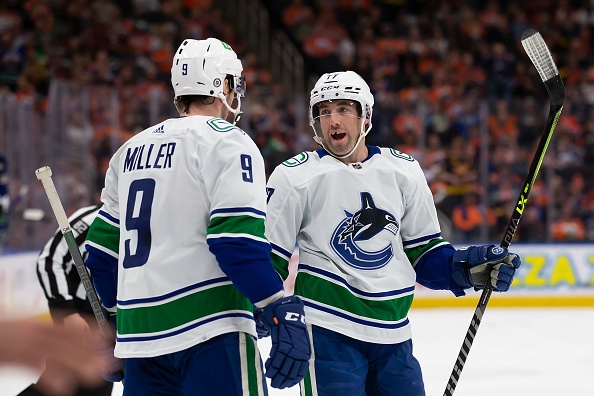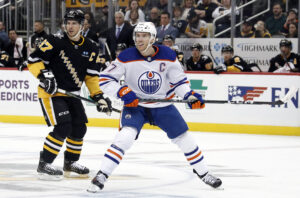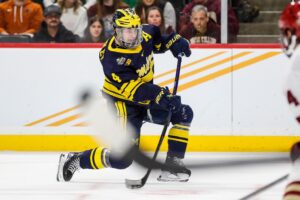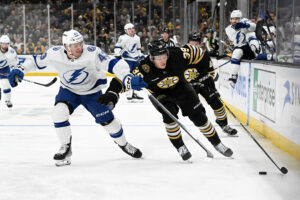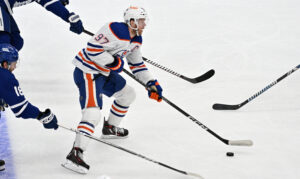The Vancouver Canucks season is coming to an end. A near-miss for making the playoffs after a fantastic turnaround mid-season (Bye Travis, bye Jim) and a fun but ultimately disappointing run to the finish line (BRUCE! THERE IT IS), has many fans turning to Twitter – and on each other in true Canucks fandom fashion – to ask what will happen or should happen next for the Vancouver Canucks future over the off-season.
Will Bruce Boudreau resign? Will they / should they lock in J.T. Miller for a long-term contract, or ship him for draft picks? Will they keep paying Jaroslav Halak a high salary (including bonuses) when making Spencer Martin the set back-up might be the more cost-effective (and overall effective) option? Do they ship Brock Boeser, Bo Horvat, or Tyler Myers? What will make them a top-tier playoff-making team next season (a task the Canucks are very capable of on paper, only sometimes on ice), let alone bring them that elusive silver chalice one day? What is the solution to this frustrating team for its frustrated fans?
Let’s take an assessment of the Vancouver Canucks future:
Assessing the Vancouver Canucks Future
The Good
There is actually a lot of good. The Canucks do not lack firepower, for one. With three 30 goal scorers (a task the team has not accomplished since 1993) in Elias Pettersson, Miller, and Horvat (With Boeser, Conor Garland, and Vasily Podkolzin being no slouches and garnering 21, 18 and 14, respectively and three others in double digits), the offensive output doesn’t seem to be a problem. A lot of that is likely due to the offensive-minded coaching of BB. However, it’s when the team uses its offence that may be a problem. More on this below.
More good follows with the Canucks currently having a Vezina quality goaltender in Thatcher Demko and a perennial future Norris candidate and team record-breaker Quinn Hughes (both signed in for reasonable cost), as well as a semi-solid blue line with assist getter and high hockey IQ- haver Oliver Ekman-Larsson, as well as gritty checkers/hard workers like fan favourite Luke Schenn (Hughes’s D partner) and Brad Hunt. And then of course there is future of the franchise, Elias Pettersson.
Looking deeper, with solid contributors like Podkolzin and Nils Hoglander – the latter who slipped a bit after Green left – and the underrated Tanner Pearson, the Canucks shouldn’t have any problems on the O front, and perhaps with a few adjustments, the D/checking front either.
The Bad
Consistency, for one, the bottom six for another. And the cap, cap, cap issues. It seemed some days that only the Canucks could thrash a team like Calgary 7-1 or stick it out against tough teams like Vegas and pull out a win when needed. But then, they’d turn around and lose two or three games in a stretch to teams like Buffalo, Chicago, Ottawa, or Detroit, showing very little goal output. Their oft-talked-about starts and first periods over the season were atrocious (only getting better too little too late), and the same story goes for the special teams (PP and PK turned around, but far too late in the season).
In addition, the lack of contribution and consistency from some on the bottom six (Jason Dickinson, Hoglander) had BB bringing others. Juho Lammikko and Alex Chiasson showed flashes of output but could use more time playing with better players (Chiasson had a great audition on the second line before Boeser came back from injury late season and showed some solid play again). The lack of good starts to games and falling behind in the first periods can possibly be chalked up to immaturity on the part of the Canucks younger, talented players making mental errors (nerves as it were). It can be addressed by the coaching staff in the off-season, and by keeping important leaders like Miller and Horvat on the roster.
The Ugly
Those darn overtime losses (again, maturity in crunch time), special teams, and let’s be honest: Travis Green. With offensive potential like that, the Canucks should have had a far more effective PP squad. Additionally, mental errors and breakdowns on the penalty kill led to far too many crucial goals against. This needs to be addressed by coaching in the off-season and throughout the season next year. As for the Green era, it may be easy to pin all of the blame on a relatively new coach (remember the bubble run?) for the disaster that was the start of the Canucks year, but truth be told maybe Green was a good (not great) coach who found himself skippering a team that had lost faith in not only him early but also in themselves.
In the end, maybe the ugly was us, the fans, yelling at each other about whether it was Benning and/or Green to blame for everything. But hiring an experienced, no-nonsense coach and proven winner like Boudreau and cleaning house in the front office was the exact remedy the team needed, even if it ultimately didn’t take them to the playoffs. Let’s not forget, however, that even under hero-coach Bruce Boudreau the Canucks still dropped key games to teams they could have and should have beaten. This goes back to maturity and consistency. So, how can this be addressed?
What the Canucks Need
Re-signing Boudreau should be the top priority. Now that he has shown he can win with this team and likes Vancouver, a multi-year contract should not be out of order at all. Secondly, while general manager Patrik Allvin and president of hockey operations Jim Rutherford et al. have been slowly and in piecemeal fashion clearing up the cap issues created by the previous management and have some great value for contract signings under their belt (Demko, Hughes, and Pettersson all locked in for now), now would be the time to cut some fat. Are players like Myers (past his prime and prone to mental errors) and Jaro Halak really worth the money the Canucks are paying them? These players could be shopped and replaced with younger, cheaper options or draft picks that could improve the franchise W column in the long term.
And, while we are talking about salaries, the new Canucks management is going to have to wrestle with some questions over whether players like Boeser could be traded to allow room for promotion and/or improvement for cheaper players. And finally, there is the problem of J.T. Miller. The forward had an amazing run and an all-star performance this year. He looked to finish in the top-10 league-leading scorers and notch a near 100-point season. So, do the Canucks sign him to a big, whopping long-term contract, or ship him for the future? Stephen Rogat over at Canucks Army has a solid possible solution.
In summary, despite a disappointing end to this season, the Canucks have nowhere to go but up. With a good mix of youth and experience, solid talent, an elite goaltender and a fantastic coach, the Vancouver Canucks future looks bright on the ice. Solid role players like Garland (look at him go!), Brad Hunt, and Schenn only contribute and rarely make mistakes. Matthew Highmore and Hoglander can improve, and Elias Petterson has been on fire and is approaching a career year. Hughes is among the best defencemen in the league. He and Pettersson are coming back with more maturity next year. Podkolzin will only get better too.
With a little retooling and refinement in the off-season, possibly a big trade or two and a good pick come the draft lottery, things can look really good next year and in the Vancouver Canucks future. As coach Bruce put it after the 6-3 loss to the Flames and basic final dagger in the Canucks playoff hopes: “It is difficult to get emotionally up for every game…sometimes it works and sometimes you get the inconsistencies, but it’ll make them better for next year for sure. They’ll know the consistency that they have to go from day one to day eighty-two.”
Main Photo:
Embed from Getty Images


